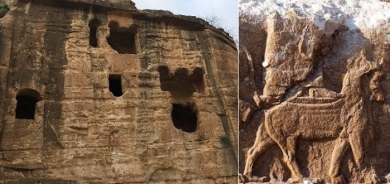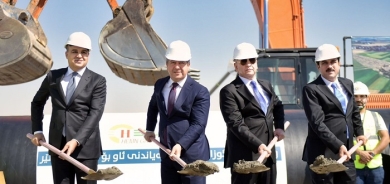Street battle rages near Egypt’s Interior Ministry; soccer deaths behind new anger

Riot police fired tear gas at protesters who hurled rocks back at them near the headquarters of the interior ministry, after a night of confrontations that left hundreds injured, according to AFP.
Five people were reported to have been killed in cairo and Suez as police used live rounds to hold back crowds trying to break into a police station and fought in front of the state security headquarters, Al Arabiya reported citing witnesses and the ambulance authority personnel.
The Real Estate Taxes building, which is located near the Interior Ministry premises in central Cairo, has been set on fire, Al Arabiya correspondent in Cairo said. As many as 1,051 people have been injured in the Cairo clashes, many of them by inhaling teargas, Al Arabiya reported citing the Health Ministry.
Gunmen torched a police station in eastern Cairo and freed detainees, security officials told AFP, amid nationwide unrest following football-related violence that left scores dead.
The gunmen, carrying automatic weapons, stormed the police station in the al-Marg district, freeing the detainees before setting fire to the building.
Egypt’s Public Prosecutor, meanwhile, issued travel bans for former Port Said governor Maj. Gen. Ahmed Abdullah, former head of the Egyptian Football federation Samir Zaher and three top security officials in the governorate.
Crowds tried to storm police headquarters in both cities, the state-run Middle East News Agency reported. Demonstrators blame police for failing to prevent the violence that followed a soccer match on Feb. 1 in the coastal city of Port Said.
Most of those killed in the Port Said football stadium on Wednesday night were crushed in a stampede and the government declared three days of mourning, but protesters hold the military-led authorities responsible.
It was the country’s deadliest incident since an uprising ousted Hosni Mubarak almost a year ago and it gave fresh impetus to regular street protests against Egypt's ruling generals.
“We will stay until we get our rights. Did you see what happened in Port Said?” said 22-year-old Abu Hanafy, who arrived from work on Thursday evening and decided to join the protest, according to Reuters.
The ministry in Cairo, an object of hatred for football fans who say lax policing was to blame for the stadium disaster, has been hemmed in by the street battles since Thursday.
Thousands were still battling riot police there and more protesters were expected to gather in the center of the capital for a “Friday of Anger” declared by 28 youth activist groups and political parties.
A Reuters witness heard firing and found gun pellets on the ground. A core of demonstrators had heaved aside a concrete barrier blocking a main road near the ministry overnight to get closer to the building.
“We pulled it down with our bare hands,” said Abdul-Ghani Mohammed, a 32-year-old construction worker. “We are the sons of the pharaohs.”
Hundreds of injuries
Ambulances had to intervene overnight to extract riot police whose truck took a wrong turn into a street full of protesters.
Police fired round after round of teargas but the wind picked up on Friday afternoon to waft the fumes back to the police lines, leading the rioting protesters, some of whom waved soccer team flags, to cry “God is Greatest”.
Some of the demonstrators, mostly men in their late teens and 20s, goaded the security forces defending the neat five-story ministry building, shouting “The army, the police - one filthy hand.”
An army lieutenant was killed by a security vehicle that ran over him by mistake, Health Ministry officials said.
Rocks thrown by protesters were strewn across streets that two months ago witnessed violent clashes between police and activists who see the Interior Ministry as an unreformed vestige of Mubarak’s rule.
Hardcore football fans known as “Ultras”, who often clash with the police and were at the forefront of the uprising against Mubarak, vowed to continue their protests.
“The crimes committed against the revolutionary forces will not stop the revolution or scare the revolutionaries,” said a pamphlet printed in the name of the ultras.
In Suez, witnesses said fighting broke out at a local police station in the early hours of Friday. “We received two corpses of protesters shot dead by live ammunition,” said a doctor at a morgue.
Many shops in Suez were wrecked and the facade of the Suez Canal Bank was destroyed.
Police cordoned off the Suez state security headquarters and a Justice Ministry compound with razor wire and seven burned-out vehicles lay nearby. Roads were strewn with glass.
New criticism on military council
The soccer stadium deaths have heaped new criticism on the military council that has governed Egypt since Mubarak stepped down. Critics regard the generals as part of his administration and an obstacle to change.
The army leadership, in turn, has presented itself as the guardian of the “Jan. 25 revolution” and promised to hand power to an elected president by the end of June.
Health officials said at least 1,000 people were hurt in Port Said when fans invaded the pitch after local team al-Masry beat Cairo’s al-Ahly, Africa’s most successful club.
Hundreds of al-Masry supporters surged across the pitch to the visitors' end and panicked Ahly fans dashed for the exit. But the steel doors were bolted shut and dozens were crushed to death in the stampede, witnesses said.
The cause of the violence has been the focus of intense speculation. Some believe it was triggered by unknown provocateurs working for remnants of the Mubarak administration who are seeking to sabotage the transition to democracy.
Fans were puzzled at how match officials allowed the game to continue even as rival supporters threw stones and fired flares.
They also pointed to a thin police presence given the tense build-up to the game and a precedent of violence at such a highly charged event.
Interior Minister Mohammed Ibrahim said the fans started it by insulting and provoking each other.
He was widely blamed for the deaths during an emergency parliamentary session on Thursday. MPs including the Islamists who control some 70 percent of the chamber called for him to be held to account and accused him of negligence.
Safwat Zayat, an analyst, said the incident had done further damage to the image of the country’s military rulers. “The current events push in the direction of speeding up the transfer of power to civilians,” Zayat said.
Members of the newly elected parliament on Thursday demanded the government step down, and criticized the military council. Prime Minister Kamal al-Ganzouri told lawmakers that the Port Said security chief had been suspended and the head and board of the football association fired.
(Al Arabiya)













